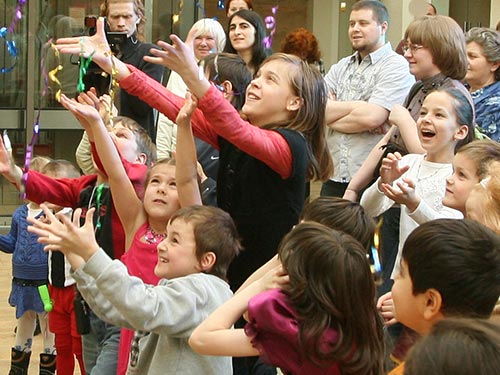History of JDC
2000s : JDC in the New Millenium—Touching Lives, Transforming Communities
The new millennium brought with it unprecedented events in JDC history. For some of the poorest Jews in the world, vital assistance became possible through a class action suit brought by Holocaust survivors against Swiss banks and other entities. Under one of the classes of the 1998 Swiss Banks Settlement, Chief Judge Edward R. Korman of the U.S. Federal Court of the Eastern District allocated $138 million over a ten-year period (2001-2011) for Holocaust survivors now living in the former Soviet Union—“double victims” of both Nazism and Communism. In 2001, the Court appointed JDC as the agency to administer welfare services to these victims in the FSU via its network of Hesed welfare centers. That year, JDC’s Hesed network served a peak caseload of over 250,000 elderly survivors.
At the same time, efforts to revitalize Jewish life and rebuild communities in the former Soviet Union were expanded. Jewish activities and programs for all ages continued to operate through scores of Jewish Community Centers throughout the FSU, including family retreats and summer camps. As of year-end 2007, JDC’s welfare or Jewish renewal activities were reaching people in nearly 3,000 cities, towns, and shtetls in the vast region of the FSU.
Ongoing movement toward a unified European community, which culminated in the 1993 formation of the European Union, was also reflected in the increasing connectedness of the continent’s Jewish communities. Against this backdrop, JDC positioned its future role in Europe as an expert in community development and organization. In partnership with the Weinberg Foundation, JDC introduced a regional structure to its activities to promote interchange and larger-scale programming among Jews from proximate geographic areas with similar linguistic, cultural, and historic backgrounds. Participant-driven gatherings and mass annual events for young adults in the Balkan Black Sea Gesher, Danube Weinberg, and Baltic regions are positive indicators of JDC’s partnership and progress in building a borderless Jewish community in Europe.
JDC’s most critical intervention in Latin America to date came following the December 2001 economic crash in Argentina, which plunged more than one-third of the local Jewish population below the poverty line. At its peak, JDC’s network of social assistance centers organized in partnership with local Jewish organizations provided essential relief—including food, medicines, and utilities and rent subsidies—to more than 36,000 beneficiaries. As the Argentine Jewish community rebounds, it is increasingly taking over responsibility from JDC for the remaining assistance programs, with JDC’s complete phase-out of relief programs expected in 2011.
Immediately following the South Asian Tsunami of 2004, JDC collected over $19 million dollars and mounted its largest-scale nonsectarian effort to date through its International Development Program (JDC-IDP). Partnering with Israeli and local organizations in Sri Lanka, India, Thailand, and Indonesia, JDC-IDP launched myriad programs, largely focusing on trauma therapy and training, rebuilding demolished schools, creating model refugee housing, empowering women through employment, and rehabilitating devastated fishing villages.
Responding to the outbreak of intifada terrorist attacks in Israel in 2002, with funding from the UJC /Federation Israel Emergency Campaign, JDC provided summer camp experiences for 300,000 children as well as other services to ease the strain on communities under fire.
Four years later, the summer of 2006 saw one million Israelis—Jews, Muslims, Christians, and Druze—on the front lines as Hezbollah’s katyusha rockets bombarded Israel’s north during the Second Lebanon War. Leveraging its partnership with the Government of Israel and extensive infrastructure in the country, JDC mobilized immediately, focusing on bringing vital relief to Israel’s most vulnerable citizens—children, elderly, immigrants, the disabled—as they were under attack and in the immediate aftermath. JDC’s Toward a New Galilee initiative aims to help the north not only overcome the impact of the war, but also put in strong community frameworks and boost economic opportunity to bring longer-term vitality to the region.
To offset the devastating impact of escalating missile attacks and a deteriorating security situation in Sderot, the Gaza border region, and the southern conflict zone in 2007-08, JDC expanded its already substantial activity in the area to include: children’s programs such as trauma therapy and emotional support; respite trips for vulnerable elderly and disabled individuals; capacity training and emergency consultation for municipalities to enhance their services; and increasing volunteerism as a community resource to ensure that assistance reaches all of those in need.
A celebration of JDC’s lifelong work in Israel since 1914 came when it was awarded the esteemed 2007 Israel Prize for Lifetime Achievement and Special Contribution to Society and the State of Israel, the Jewish state’s highest civilian honor.
In August 2008, as the conflict between the Russian Federation and Georgia reignited, JDC staff traveled under fire to ascertain the whereabouts and well-being of Jewish families and elderly welfare clients—and to ensure that they continued to receive food, medicine, and other basic necessities. This was but the latest example of JDC’s ongoing commitment to ensure the safety and security of Jews wherever and whenever they are in need.
Jewish activities and programs for all ages continued to operate through scores of Jewish Community Centers throughout the FSU, including family retreats and summer camps.
